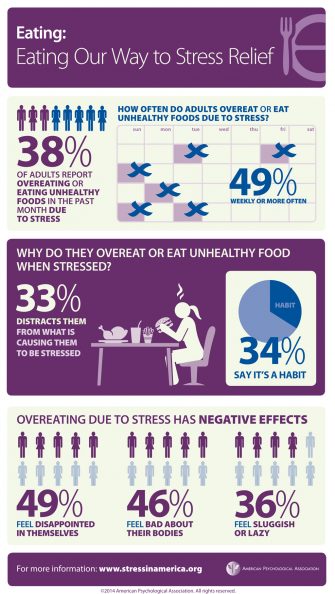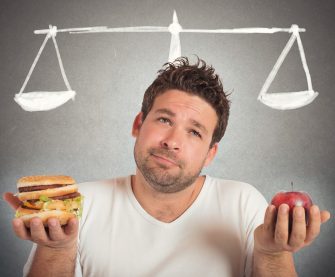Stress Eating Switches to Boost Your Mood

In times of stress, people look for comfort. For many of us, that means looking in the fridge or pantry.
According to the American Psychological Association’s (APA) Stress in America™ survey, 38% of adults either overeat or eat unhealthy foods due to stress. Almost half say this occurs weekly or more often. During the COVID-19 health crisis, increased stress at a time when many were staying in their home all day compounded the issue since it was even easier to indulge in a “quick snack”.
Unfortunately, in response to stress, people often gravitate towards high-calorie, high-fat foods also fondly referred to as “comfort foods”. The problem is that these foods have been shown to be even worse for us when we are stressed.
While these are unhealthy on any day, the APA reports the body stores more fat when it is under stress, making them even more unhealthy.
Using food as a physical solution to a psychological stress leads to both physical and psychological effects. For example, over a third, 36%, of stress eaters report feeling sluggish or lazy. Additionally, 49% report feeling disappointed in themselves and 46% report feeling bad about their body.
In a recent interview, stress, resilience and mind-body medicine expert Eva Selhub, M.D. said, eating highly processed foods and snacks with a lot of sugar may lead to bodily inflammation, which can increase fatigue, anxiety and depression.
All is not lost!
Stress is a fact of life and won’t be going away. It has to be managed, and while stress eating unhealthy foods can add to the problem – healthy food can actually counteract the effects of stress.
Am I hungry or stressed?
There are multiple connections between the stomach and the brain, so the answer to this question may not always be obvious. But, if you are truly hungry, then your body is needing nourishment.
Nutritionist with the American Nutrition Association Deanna Minich said that hunger tends to last longer (when it is really hunger) and can be satisfied by a variety of foods. On the other hand, stress eating tends to be an automatic instinct.
Ever opened a bag of chips or cookies to get “a little snack,” and the next thing you knew it was empty? Odds are you could have avoided this if you first asked yourself, “Am I physically hungry? Or am I stressed?”
If the answer is stress, Selhub suggests trying another means of stress management. Take a walk, call or text a friend, do some breathing exercises, or maybe spend a few minutes reading. The possibilities are endless.
Selhub also suggests keeping a schedule. Even when the schedule becomes a little more relaxed, continuing to eat at or near regular meal times will help your body stay on track.
 How do I eat healthy when I’m stressed?
How do I eat healthy when I’m stressed?
Let’s face it, when you are stressed out is not a good time to be trying to figure out a new eating plan. So, when you have a few minutes, take that time to write out a list of healthy foods you enjoy, both for meals and snacks.
Make a plan for what you want to eat over the next several days and make your grocery list accordingly. Pick-up and delivery grocery services may make it easier to avoid the temptations in the aisles of less healthy snacks.
Take it a step further and do some prep work ahead of time. Go ahead and wash produce. Put snacks into individual serving size containers or reusable bags. Then, not only do you have a snack ready, it’s already portioned out for you. Some meats and vegetables can be prepped as well. Peel and cut carrots up ready for snacks or meals. Brown meat and put in containers by the meal. This makes both snacking and cooking easier.
What are healthy switches for when stress cravings call?
There will be times that you will need a snack. Here’s the top 5 Mood Boosting snacks from Eat This Not That to keep on hand so when that time strikes, you can stay on track with your healthy choices.
- Dark Chocolate – High quality dark chocolate contains serotonin, which acts as an antidepressant. It also promotes the production of endorphins, brain chemicals that are associated with mood-enhancing. To get these benefits, look for 70% cocoa (or higher) and select items with the fewest ingredients. Keep in mind, the recommended amount is one ounce per day, so pre-wrapped individual servings might be the way to go to avoid going overboard.
- Popcorn – You may think of movie theatres when you hear popcorn, but it can actually be a healthy snack. It is rich in tryptophan, an amino acid that helps the body produce serotonin (same chemical that’s in dark chocolate). Healthy popcorn brands abound, so try a few to find the ones you like best.
- Bananas – When it comes to low maintenance, bananas are about as easy as it gets. Rich in vitamins B6, A and C, fiber, tryptophan, potassium, phosphorous, iron, protein and healthy carbohydrates, they give you a big bang for your buck nutritionally speaking. As an added bonus, they are also easy on the wallet!
- Nuts – For people without nut allergies, nuts, especially almonds, cashews and walnuts, are a great snack. The specific nutrients vary by type of nut, but many of them boost serotonin levels, contain Omega-3’s, tryptophan, protein, and B vitamins. Nuts are not low calorie, so watch the portion size. And for best nutritional value, choose raw, unsalted nuts.
- Chickpeas – With lots of vitamin B6, protein and magnesium, chickpeas are a very versatile food. B6 is known to improve energy and reduce anxiety. Protein helps the brain produce serotonin and dopamine, 2 of the hormones that make you feel happy. Hummus is a popular way to eat chickpeas, but there are other options too.
Your meal time can help reduce your stress as well. Stress expert Pete Sulack, author of “Unhealthy Anonymous,” a book about stress management and overall wellness, suggests eating superfoods when you are stressed. His top picks include: kale, broccoli, leafy greens, celery, nuts, oily fish like salmon, fermented foods like kimchi, herbs and spices, and organic berries high in vitamin C. When you go out for lunch on a stressful workday, skip the fast food burger and fries and look for a good salad bar.
Eating healthy to PREVENT stress?
YES! You read that right, recent research is suggests that proper nutrition may play a role in helping reduce or even prevent stress!
A study published in 2022 explored the possibility that the amount of variety we normally include in our eating habits could be related to our stress levels. Researchers used data from the China Health and Nutrition Survey (CHNS) and included over 7,000 subjects. They coded foods into 29 food groups and calculated dietary diversity scores based on the number of food groups consumed during a 24-hour recall. Just over half (56.55%) of subjects perceived a high stress level. Interestingly, dietary diversity was lower in this higher stress group. Additional analysis “demonstrated that participants with higher daily dietary diversity were less likely to experience higher-level psychological stress, compared with participants with lower daily dietary diversity.”
Questions remain regarding the possibility of nutrition preventing stress. Do people eat a smaller variety of foods because they are stressed and simply reach for easy and familiar foods? Or, are people who routinely consume a wide variety of foods better able to handle the stressors that come their way? More studies are needed to further evaluate these and other questions. However, we know that eating various foods from the major food groups gives our bodies a range of healthy nutrients our body needs, not to mention adding more flavors and textures that make mealtime interesting.
Stressful times will always come, but it’s good to know that we can combat its effects with a plan for healthy eating. Try these tips and keep your healthy habits on track. You don’t have to make changes all at once. Making little switches here and there can add up to big benefits over time.
Talk to your doctor of chiropractic at your next visit about how small changes in diet, exercise and stress management can help both your physical and overall health and wellness. If you don’t have a regular chiropractor, you can find a doctor near you at www.tnchiro.com/find-a-doctor.
Article originally posted April 14, 2020. Updated and reposted February 28, 2023.
REFERENCES
Iati, M. “Stress-eating for comfort in a time of anxiety? Here’s how experts say you should deal.” Washington Post online March 19, 2020
https://www.washingtonpost.com/lifestyle/2020/03/19/stress-eating-comfort-time-anxiety-heres-how-experts-say-you-should-deal/?fbclid=IwAR22lTQI1CRBVKCgLbWL6pahNRFVwRsrYmGG45z7cY2CugIPw6LQC14JvQ4
“13 Mood-Boosting Snacks to Make Your Day Better” Eat This, Not That! 2/14/2020 https://www.msn.com/en-us/health/nutrition/13-mood-boosting-snacks-to-make-your-day-better/ss-BB100Itk#image=1
Booth, Jessica These Hacks Will Make It Easier to Eat Healthy Redbook 1/13/2020 https://www.msn.com/en-us/health/nutrition/these-hacks-will-make-it-easier-to-eat-healthy/ss-BBYUYh6#image=1
“Trying to eat our way to stress relief” American Psychological Association https://www.apa.org/news/press/releases/stress/2013/eating
Zhou J, Wang H, Zou Z. Inverse Association between Dietary Diversity Score Calculated from the Diet Quality Questionnaire and Psychological Stress in Chinese Adults: A Prospective Study from China Health and Nutrition Survey. Nutrients. 2022 Aug 12;14(16):3297. doi: 10.3390/nu14163297. PMID: 36014804; PMCID: PMC9412500.
Howard, Jacqueline, “For stress, superfoods are better than comfort foods” CNN. Published 9:00 AM EST, Thu December 15, 2016 – accessed 2/23/23 https://www.cnn.com/2016/12/15/health/foods-to-reduce-stress-anxiety/index.html